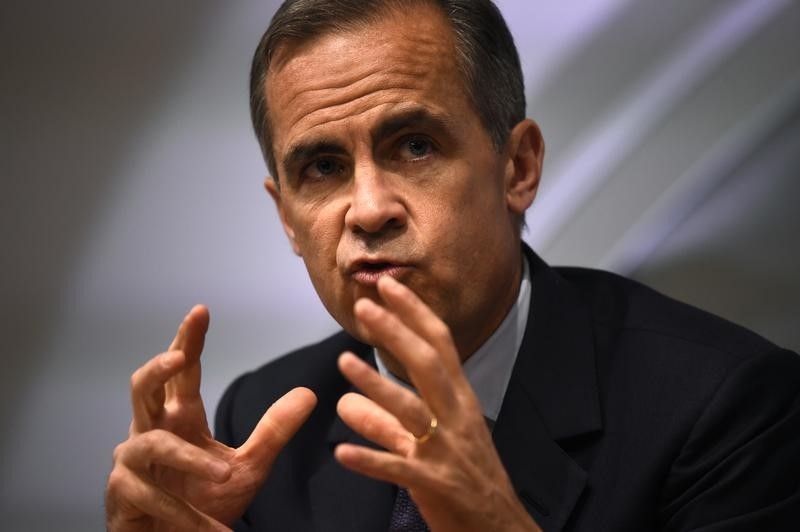Investing.com – A recent survey of economists showed high expectations for the Bank of England (BoE) to cut interest rates to a record low on Thursday, despite comments from the British monetary authority’s governor Mark Carney that seemed to suggest a move would not come before August.
Surveys show disparate expectations
30 out of 54 economists, equivalent to 56%, in a survey released by Bloomberg on Monday pointed to a forecast for a 25 basis point (bp) cut to 0.25% when the BoE announces their next policy decision on Thursday.
That would be a new record low after having held steady at 0.5% since March 2009.
The more recent survey was in stark contrast to a Reuters poll released last week that saw practically two-thirds of 52 economists predicting that there would be no change to rates. In that survey, 17 economists did forecast a cut to 0.25% with another two suggesting the price of money would be reduced to 0%.
Median forecasts in the Reuters poll showed a 25bp reduction during the July-September quarter.
BoE governor Carney pointed to standstill until August
The latter projection appeared to coincide more evenly with BoE governor Mark Carney’s own stance delivered in a speech on June 30.
“The economic outlook has deteriorated and some monetary policy easing will likely be required over the summer," he said in the speech dealing with uncertainty over the economic impact of the U.K.’s decision to leave the European Union (EU), known as a Brexit.
Yet Carney specified that the BoE’s Monetary Policy Committee (MPC) would simply give an initial assessment of the impact at the meeting ending July 14 and would then give a final evaluation at the following meeting on August 4 which would be accompanied by updated economic forecasts.
“In August, we will also discuss further the range of instruments at our disposal," Carney indicated.
BoE action since the Brexit vote
Since that speech, the BoE took action, reducing the U.K. countercyclical capital buffer rate from 0.5% to 0% of bank’s U.K. exposures in order to give “greater flexibility to supply credit to U.K. households and firms” to the tune of up to £150 billion ($197 billion).
“Those businesses and households who want to seize viable opportunities in the post-Brexit world can be confident that they will be supported by the financial sector,” Carney explained.
Carney revisited the issue on Tuesday in his testimony to the U.K. Treasury Committee on the Financial Stability Report, warning that during the current period of “increased uncertainty” there could be “reductions in the credit demand, reductions in risk-taking”.
The purpose was to underline to households and businesses that there was credit availability, though a lack of demand cut reduce lending.
Since BoE is currently in the purdah period, wherein policymakers are not supposed to talk in detail about the outlook for interest rates, ahead of Thursday’s decision, Carney did not directly comment on plans for the upcoming meeting.
Instead, he curtailed many of his responses and limited his remarks to the fact that the MPC needed to consider that a softer economic outlook could warrant monetary policy.
Lack of data referring to impact post-referendum
Beyond the announcement of the reduction in capital buffers, the BoE has had little incoming data that refers to the post-Brexit time frame, even though weakness in the British economy in the run-up to the June 23 referendum had become clear.
On Tuesday, U.K. retail sales on a like-for-like basis fell 0.5% in June, while the second quarter data showed the weakest consumer confidence since May 2009.
There had also been disappointing readings from the purchasing managers’ index (PMI) for manufacturing and services which the market research group Markit said pointed to growth of just 0.2% for the second quarter.
Markit chief economist Chris Williamson did suggest that the data was already in territory normally associated with rate cuts.
Adding to the issue, and as the above data showed, the economy had already been affected by uncertainty in the run-up to the vote and it was unclear just how much further damage the decision to leave the EU would have on future growth.
Political process moves ahead faster than expected
Investors appeared to applaud the imminent appointment of Teresa May as the new Prime Minister to replace David Cameron much earlier than expected, which could set the scene for trade negotiations with the EU to move forward.
The pound rallied more than 1% against the dollar on Tuesday, pulling back from the post-Brexit 31-year low of 1.2794 set last Wednesday, in what could be interpreted as a sign nerves were calming.
Consensus and risk
In any case, consensus outlook for Thursday’s decision still predicted the BoE to stand pat on interest rates. Economists by and large expected six of the nine voting members of the MPC to opt to hold rates steady with only the remaining three having changed their preference to a cut.
However, with all the recent noise about expectations for the BoE to ease on Thursday, there is the risk that a lack of action, through an interest rate cut or an increase to the quantitative easing program, could surprise some market players, causing them to unroll positions.
